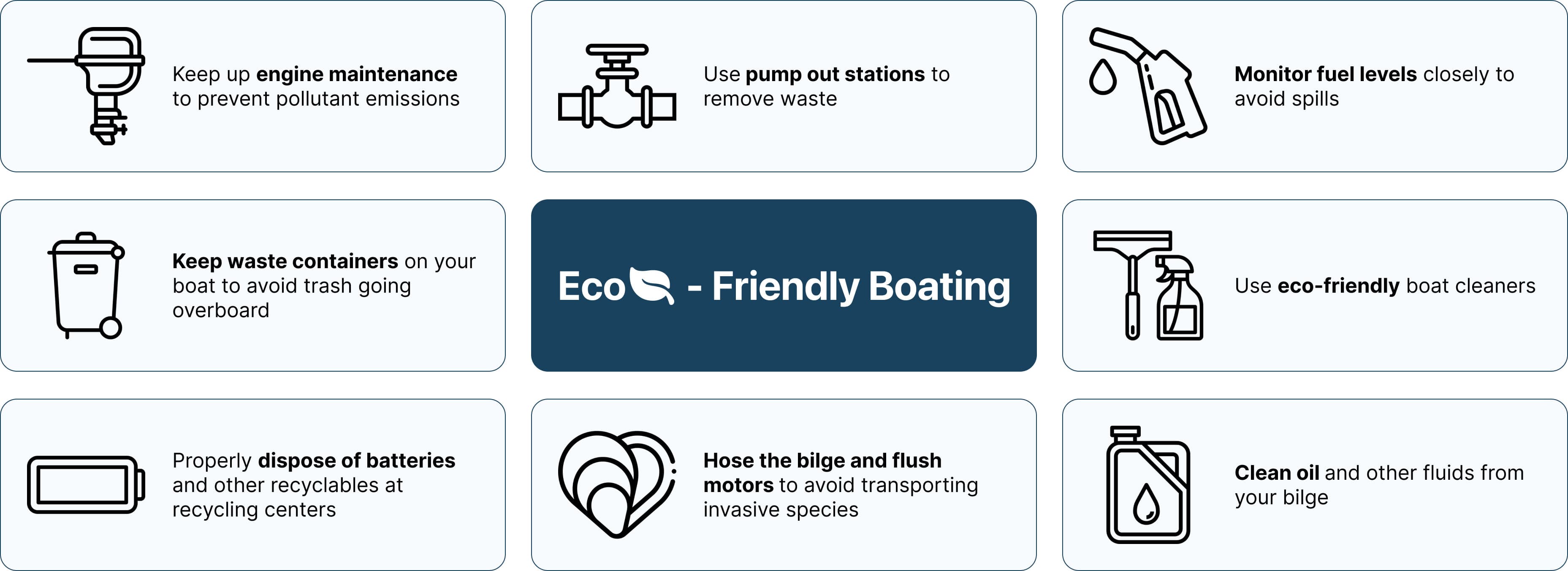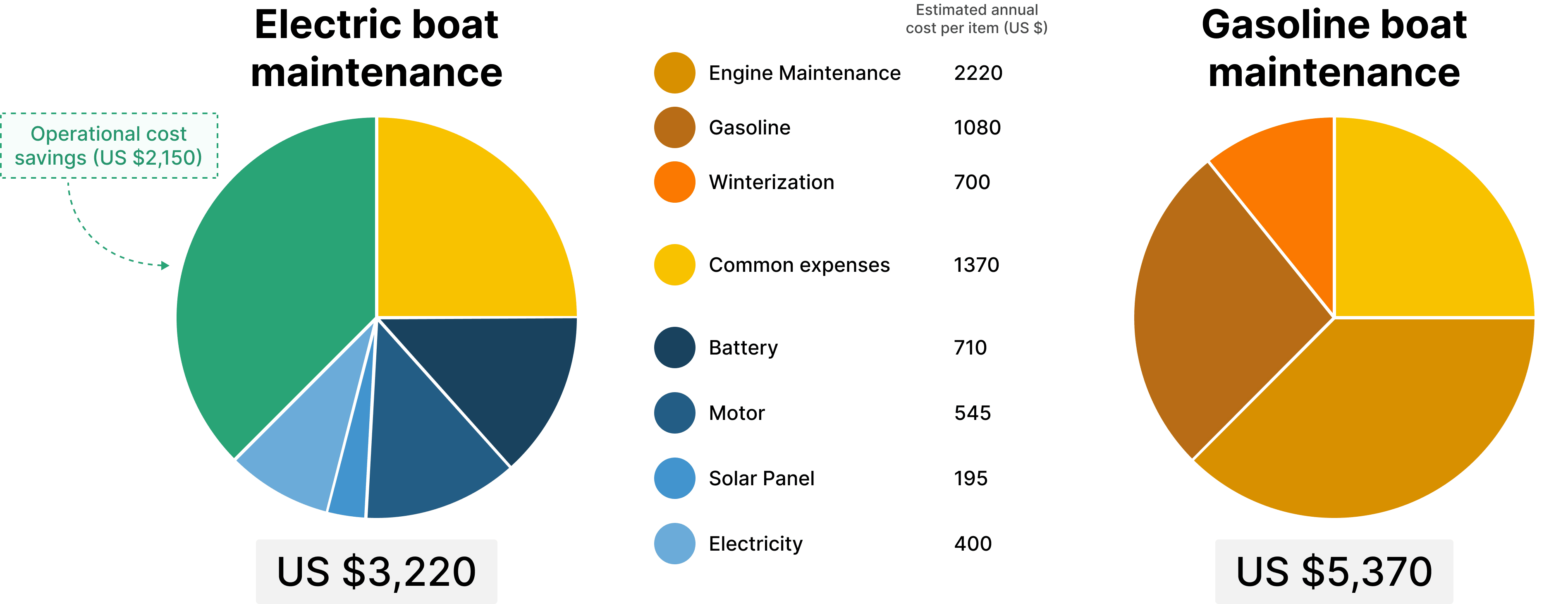
Renewable Energy Boats: A Comprehensive Guide on Green Boating
Boating offers a unique immersive experience and an opportunity to explore the world's waterways. However, conventional boating practices, with their reliance on fossil fuels and lack of environmental consideration, have led to negative impacts on our ecosystems.
To ensure the longevity and health of our waters, it is crucial to adopt green boating practices that involve renewable energy technologies.
This comprehensive guide will explore the benefits of renewable energy boating and provide practical insights into eco-responsible maintenance for inflatable boats with solar power (solar boats) and gas outboard motors.
Benefits of Sustainable Boating
Reduced Emissions
One of the most significant advantages of renewable energy boating is the reduction of harmful emissions. Traditional gasoline-powered boats emit carbon dioxide (CO2), nitrogen oxides (NOx), and particulate matter, contributing to climate change and poor air quality. In contrast, renewable energy sources like electric outboards and batteries produce zero emissions during operation, helping combat the greenhouse effect and improving air quality in ecologically sensitive areas.
Noise Reduction
The tranquility of our water ecosystems is essential for both wildlife and humans to thrive. Renewable energy boating systems, and electric engines in particular, operate quietly compared to their noisy gasoline counterparts. This reduction in noise pollution minimizes disturbances to marine life, preserves natural habitats, and enhances the overall boating experience.
Protecting Aquatic Life
Oil spills and fuel leaks from traditional boats pose a severe threat to marine life and their habitats. Renewable energy boating eliminates the risk of fuel spills, ensuring cleaner waterways and protecting delicate ecosystems. By embracing clean, renewable energy system solutions, boaters actively participate in the conservation of aquatic biodiversity.
Sustainable Resource Use
Renewable energy sources, such as solar, wind power, and hydroelectric power, are endlessly renewable. Embracing these sources for boating minimizes reliance on finite sources of energy and fosters sustainable resource management. In this way, renewable energy boating aligns with the principles of responsible stewardship of our natural environment.
Cost Savings
Although the initial investment in renewable energy technologies may be higher, they offer long-term cost savings. Electric engines, for instance, have lower operating costs than traditional gasoline engines due to no fuel consumption and fewer maintenance requirements. Over time, boaters can recoup the initial investment and enjoy ongoing savings while reducing their ecological footprint.

How You Can Switch to Green Boating
To join the green boating movement, it is essential to first educate oneself on the various eco-friendly boating practices and the wide array of renewable energy technologies available. A thoughtful approach involves investing into sustainable boating products, such as electric outboard motors, portable power stations, and a solar panel, while also embracing responsible maintenance routines for your boat with gas outboard motor.
Benefits of Using a Solar-Powered Boat
Electric outboard motors
Electric outboard motors are at the forefront of renewable energy boating technology. Boating enthusiasts can harness the following benefits:
-
Zero Emissions. Electric motors produce no tailpipe emissions, significantly reducing their environmental impact.
-
Silent Operation. The quiet hum of an electric motor allows boaters to connect with nature without disturbing wildlife or other water enthusiasts.
-
Energy Efficiency. Electric motors boast impressive energy conversion efficiency, allowing for longer operating times and extended boating pleasure.
-
Low Maintenance. With fewer moving parts, electric motors require less maintenance compared to their gas-powered counterparts, reducing long-term costs.

Portable Power Stations
Portable power stations can serve as a reliable and efficient emergency power source, increasing safety on the water. Charge them using solar panels, shore power, or car charging outlets and increase your flexibility during boating trips.
The off-grid independence these stations offer directly reduces your reliance on fossil fuels and promotes sustainable energy practices. The lack of noise pollution ensures an undisturbed sailing and boating experience, fostering a closer connection with nature.
Portable Solar Panels
Portable solar panels are an essential accessory for renewable energy boaters, offering a number of advantages. By harnessing the sun's energy, they provide a clean and renewable power source for boaters.
Easily transportable and set up, portable solar panels allow boaters to charge electronic devices or recharge power stations while on the move or anchored. And they play a big role in Reducing Carbon Footprint: by utilizing solar energy, boat owners can significantly decrease their carbon emissions.
Our Eco-Responsible Maintenance Tips
Inflatable Boat Maintenance
Inflatable boats are popular for their portability and versatility, but they require careful maintenance to ensure their longevity and minimize environmental impact.
Use eco-friendly cleaning products specifically formulated for inflatable boats to prevent the introduction of harmful chemicals into aquatic environments. Routinely inspect your inflatable boat for leaks or damage and promptly address any issues to prevent air or water pollution and ensure optimal performance.
We are also strongly advocating for responsible disposal practices. When it is time to retire an inflatable boat, dispose of it responsibly by recycling it whenever possible or utilizing appropriate waste disposal facilities.
Make Your Gas Outboard Maintenance Eco-Responsible
Maintaining gas outboard motors with an environmentally-friendly approach is crucial to minimize their impact on the environment and water ecosystems, including sea water. Here are some key practices and tips to ensure eco-responsible gas outboard motor maintenance:
Regular Servicing
Routine maintenance and servicing of gas outboard motors are essential to keep them running efficiently and reduce emissions. Follow the manufacturer's maintenance schedule and guidelines to ensure proper functioning.
Fuel Management
Using low-emission fuels and ethanol-free options can significantly reduce the release of harmful pollutants into the environment. Ethanol-blended fuels can lead to higher emissions and pose challenges to marine engines, so opting for ethanol-free options is preferable for eco-conscious boaters.
During refueling, take extra care to prevent fuel spills, as they can contaminate water bodies and harm aquatic life. Use spill-proof containers and fuel nozzles to minimize the risk of spills.
Proper Disposal of Used Oil and Filters & Using Biodegradable Formulas
When changing oil and filters, ensure that used oil and filters are collected and disposed of correctly at designated recycling centers or oil collection facilities. Avoid dumping them into the water or on the ground.
When lubricating moving parts of the engine of the outboard motor, choose biodegradable lubricants that are environmentally friendly and do not harm marine life.
Inspect and Repair Leaks Promptly
Regularly inspect the motor for any leaks and address them promptly. Fuel or oil leaks can have severe consequences for water quality and wildlife, so it's essential to fix them as soon as possible.
Proper Storage
During periods of non-use or winterization, store the gas outboard motor in a dry, covered area to protect it from the elements and prevent fuel or oil leakage.
Follow Boating Regulations and Guidelines
Adhere to boating regulations and speed limits to minimize disturbances to marine life and sensitive habitats. Observe no-wake zones and designated protected areas.
Educate and Share the Message
Spread awareness about environmentally-friendly gas outboard motor maintenance among fellow boaters. Encourage others to adopt eco-responsible practices and help protect our waterways and ecosystems.
Environmentally-Friendly Boating Practices
Beyond renewable energy adoption and proper maintenance, eco-responsible boating practices play a crucial role in protecting our waters and marine life:
-
Avoid anchoring in ecologically sensitive areas such as seagrass beds, coral reefs, or fragile underwater habitats to safeguard marine ecosystems.
-
Properly dispose of waste onshore and avoid single-use plastics on board to minimize litter and protect aquatic environments from pollution.
-
Be mindful of marine life and adhere to safe boating speeds, particularly in areas known for high wildlife activity, to reduce the risk of collisions and habitat disruption.
Today the boating community has a unique opportunity to preserve the beauty of our waterways and protect fragile ecosystems by adopting green boating practices and embracing renewable energy technologies.
Switch to eco-responsible maintenance for inflatable boats and gas outboard motors, incorporate sustainable products, and thus, play an active role in preserving our natural heritage for future generations. Navigate the waterways responsibly, and safeguard the environments that make boating an unforgettable experience.
